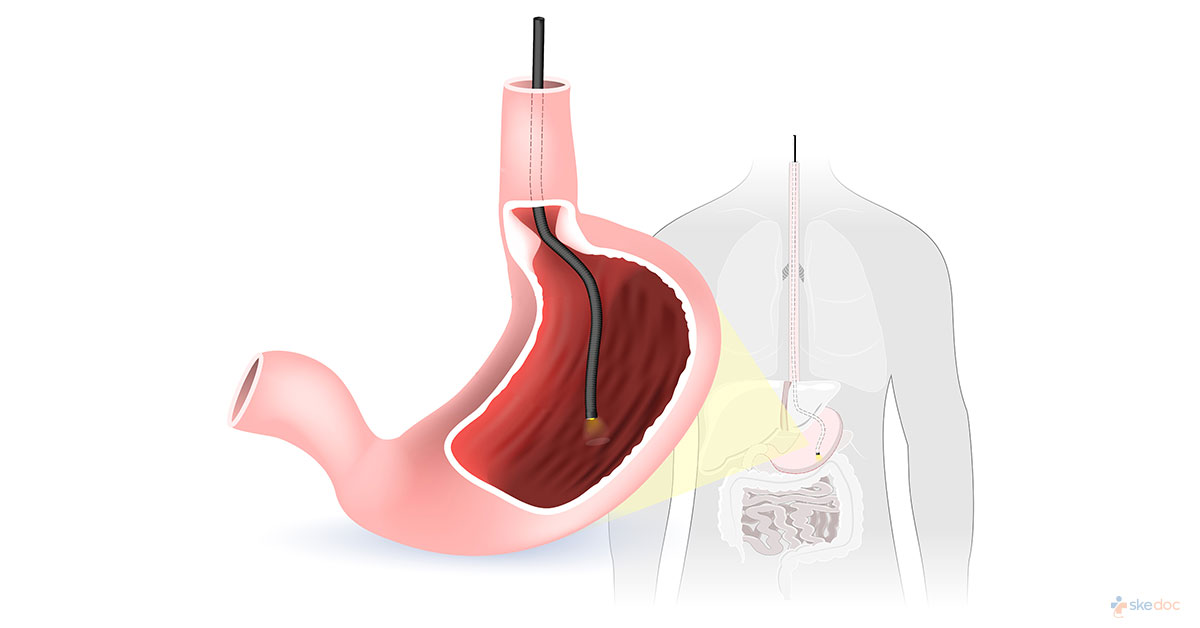Allergy
Blood Diseases
Bone & Joints
Brain
Cancer
Child Care
Cosmetic Surgery
Diabetes
Endocrinology
ENT
Eye
Gen Medicine
General Surgery
Heart
Kidney
Lifestyle
Liver & Digestive
Lung
Men’s Health
Mental health
Physiotherapy
Rheumatology
Skin and hair
Sleep Disorders
Spine
Transplant
Women Health
Thyroid
Vascular Surgery
Duodenoscopy

What Is Duodenoscopy?
Duodenoscopy is a minimally invasive procedure that is used for diagnostic and therapeutic purposes involving the upper gastrointestinal tract and the duodenum in particular.
Alternate name
- Esophagogastroduodenoscopy.
Is this procedure an elective or an emergency procedure?
Duodenoscopy is done as an elective procedure.
Types of procedure
Esophagogastroduodenoscopy may be of the following types:
- Transoral esophagogastroduodenoscopy
- Transnasal esophagogastroduodenoscopy
Indications of duodenoscopy
The indications for duodenoscopy include the following:
- Diagnostic indications for esophagogastroduodenoscopy-
- Unexplained anemia
- Upper gastrointestinal bleeding
- Heartburn and chronic acid reflux
- Persistent nausea
- Recurrent vomiting
- Surveillance of gastric or duodenal ulcer
- Surveillance of gastric cancer in high-risk individuals such as those with Barrett's esophagus or polyposis syndromes
- Surveillance after gastric surgery
- Non-cardiac chest pain
- Biopsy for malabsorption syndromes, infections, or cancers
- Therapeutic Indications for esophagogastroduodenoscopy-
- Application of cautery to tissues and control of bleeding.
- Retrieval of foreign bodies
- Dilation or stenting of strictures
- Ablation of tumors
- Placement of gastrostomy tubes
Contraindications and risk factors of esophagogastroduodenoscopy
Some contraindications for duodenoscopy may include the following:
- Presence of perforation
- Bleeding or clotting disorders
- Severe cardiopulmonary disease
- Unwilling or non-cooperative individuals
Investigations before the procedure
Some investigations that may be done before the procedure may include:
- Laboratory tests-
- CBP & ESR
- Coagulation profile and blood typing
- Liver and renal function tests
- Complete metabolic panel
- Complete urine analysis
- Blood glucose/HbA1C
- Imaging tests-
- Chest X-Ray
- Ultrasound abdomen
- Echocardiography - for some individuals.
- Electrocardiography.
Preoperative advice
Before duodenoscopy, the following may be done:
- Risks and benefits of the procedure are explained.
- Anticoagulant medications may be stopped depending on the purpose of the procedure.
- Nothing by mouth 4-6 hours before the procedure.
- Antibiotic prophylaxis is started before the procedure.
Intraoperative details
Duration: Duodenoscopy may last between 1-4 hours depending on the procedure that is being done.
Anesthesia: The procedure is usually done under conscious sedation or topical anesthesia, general anesthesia may be required in uncooperative individuals.
Description of the procedure:
After sedation is achieved and with the individual lying on his/her left side. An antispasmodic agent such as hyoscine is given to prevent the movement of the gi tract a bite block is placed in the mouth to prevent the individual from biting on the endoscope equipment. The tip of the endoscope is lubricated and under visual guidance, the endoscope is passed through the mouth, over the tongue into the oropharynx, down the esophagus, and through the stomach into the duodenum to examine its first and second parts. Insufflation is done to aid in viewing. Any liquids or solids that are present are suctioned. The procedure and the findings of the examination are recorded for further review and records, via a camera that is attached to the endoscope. Based on the procedure that is being performed other instruments such as forceps, snares, injecting needles, stent deployment units, laser units, ablation units, electrocautery units are advanced over guidewires and the required procedures are completed. The endoscope is then retracted out from the mouth.
Post-operative details
After duodenoscopy, the following is done:
- The individual is moved to a recovery room and monitored until the effects of sedation are worn off.
- Symptoms and signs of complications are monitored.
Common post-procedure occurrences:
- Mild chest pain
- Nausea
- Difficulty swallowing
- Fever
Discharge: Usually on the same day depending on the procedure that is done.
Medication: Mild analgesics and antibiotics may be prescribed.
Review: Usually on day 5 or 7 after the procedure.
Resumption of normal activities: Usually with some restrictions on the 2ndpostoperative day.
Role of diet/exercise/lifestyle changes
Some measures that may need to be taken after duodenoscopy may include:
- To follow a diet as advised by attending physician.
- To avoid strenuous activities for a few days.
Complications of duodenoscopy
Some complications that may be seen after a duodenoscopy include:
- Bleeding
- Infections
- Perforations of the esophagus, stomach, or duodenum
- Cardiopulmonary problems which are mostly as a result of the medications used for sedation or anesthesia.
- Aspiration pneumonia
Prognosis
The prognosis for duodenoscopy depends on the underlying conditions for which it is being done. Duodenoscopy is generally a safe procedure with severe complications being few.
Indications for hospitalization if required
Hospitalization is not required for duodenoscopy, but brief hospitalization may be required for some procedures.
Suggested clinical specialist/department to consult for the procedure
Duodenoscopy is performed by specialists from the department of interventional endoscopy, and gastroenterology.
Was this article helpful?
YesNo




